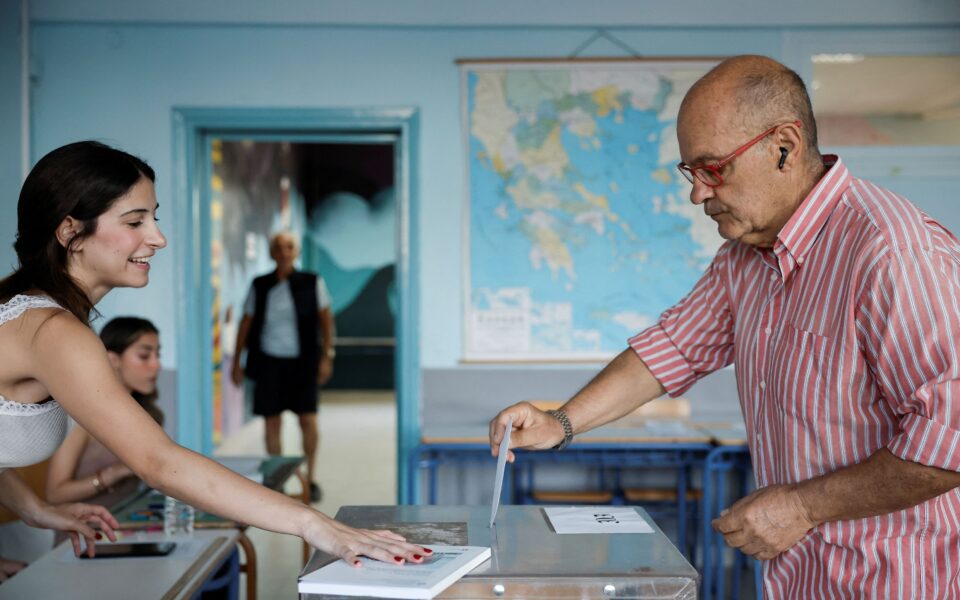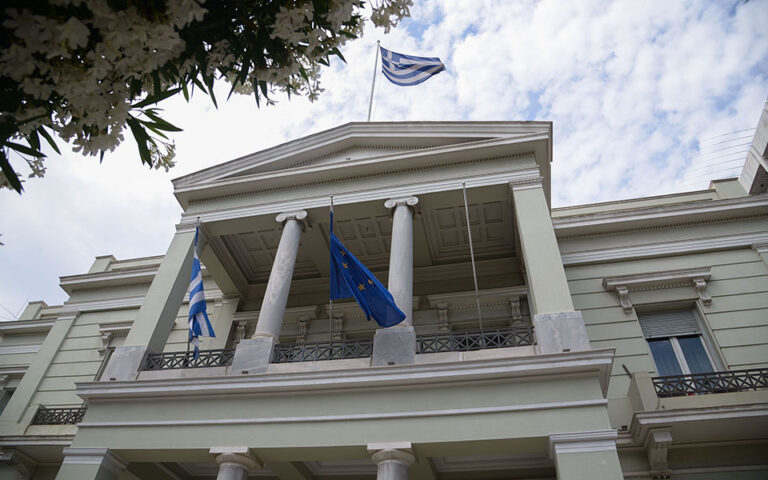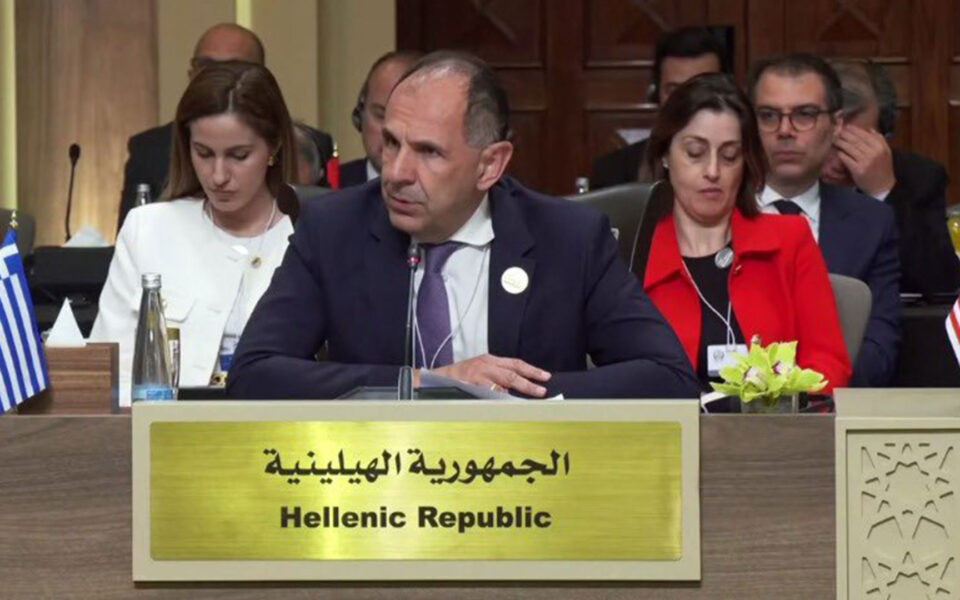Greeks head to polls for 2024 European elections


Some 373 million voters from the EU’s 27 member-states vote from Thursday to Sunday in the European election. Greeks started heading to polls on Sunday morning to choose the MEPs that will represent them in the next European Parliament.
On Sunday, 9,796,330 Greek citizens will be eligible to vote in the elections for the European Parliament.
Greece elects 21 MEPs in the 720-member Parliament.
A total of 18,380 polling stations will be open from 7 a.m. to 7 p.m. Voting hours may be extended in individual stations if there is a waiting line at closing time.
Anyone who turns 17 this year – that is, was born until January 31, 2007, is entitled to vote. Greece has one of the lowest voting eligibility ages. Only Austria, Belgium and Germany have a lower minimum age (16).
This election is the first in which people could vote by postal ballot. Of the 202,515 who registered to receive a postal ballot, about 177,800 had returned them. The rest can still vote in-person, if they so wish. A total of 237 polling stations will be exclusively dedicated to counting the postal votes.
There are 31 political parties and coalitions vying for the Greeks’ vote. In order to elect an MEP they must get a minimum of 3% of the vote. The threshold was adopted in the 1990s to prevent a Muslim minority party, whose founder, Sadik Achmed, openly proclaimed his Turkish identity, from gaining representation in Parliament.


Typically, elections for the European Parliament have been thought as ones where party identification and voting parties are looser. They are also seen as a better occasion for a protest vote than national elections. Recent opinion polls have shown 11 parties being credited, at various times, with at least 2% of voting intentions, which gives them hope for representation. It is likely that not all of them will make it.
The MEPs are elected by proportional representation.
What is at stake
As far as domestic politics go, nothing. The government will not fall, and it is only a year into its four-year mandate. But a good or bad result for any party, especially the ruling one, may have longer-term consequences.
Ruling conservative New Democracy has set the bar at matching the result of the previous European election (33.12%). Anything above would be an occasion for triumphalism. Anything below, especially if New Democracy drops under 30%, may start putting the party’s recent domination of the political landscape into question. Attrition could set in, putting first place in the next national election, which doesn’t have to be held until 2027, into play.
Main opposition SYRIZA, still nominally a leftist party although many, especially its detractors, now see it as a catch-all, and the socialist PASOK will battle for second place, with SYRIZA having gained the upper hand in recent opinion polls after a temporary dip in the second half of 2023.
For PASOK leader Nikos Androulakis, the stakes are simple: second place would be an unquestioned success, while third will not necessarily be a disaster: it will all depend on how close the margin with SYRIZA is. PASOK got 7.72% in the 2019 Euro elections and 11.84% in the June 2023 national election. It captured the country’s two largest cities, Athens and Thessaloniki, in the November 2023 local elections. Thus, success or failure will be open to interpretation.
For SYRIZA’s political neophyte leader Stefanos Kasselakis, second place could be enough, although he has at times said that he would like to match the party’s last domestic result (17.83%) and has not ruled out a result in the twenties, percentage-wise. Such a result would cement his place as leader of the opposition, having seen off intra-party rivals, many of whom bolted to form the New Left party, and marginalized former long-time SYRIZA leader Alexis Tsipras (although the enthusiasm with which Tsipras was greeted in the party’s campaign event in Athens shows that many see him as an asset, and a possible alternative). Tsipras, Greece’s first leftist prime minister, from 2015-19, doesn’t turn 50 until July 27.
Also, whatever SYRIZA’s result, Kasselakis will have to answer several lingering questions about his background.
The strength of the far-right, and the extent to which it will siphon votes off New Democracy, is another major unknown. Hard-right populist and ultranationalist Greek Solution may be set to at least double its vote share from the 2019 European election (4.18%) and the 2023 national election (4.44%). Its strength is concentrated in northern Greece and New Democracy officials are actively urging voters there not to vote for Greek Solution. Putting jailed mayor-elect of Himare, Albania, Fredi Beleri, on the New Democracy ballot was seen as an attempt to capture at least part of the nationalist vote. But hard-right voters also have other grievances against Prime Minister Kyriakos Mitsotakis, notably his support for same-sex marriage.
There are more candidates for the far-right vote, even though one of them, Spartiates (Spartans), which is represented in the national Parliament, was eliminated by the Supreme Court for being too obviously a front for Ilias Kasidiaris, the jailed former Golden Dawn MP, whose party was condemned as a criminal organization.
Of some interest also is whether New Left, made up of SYRIZA dissidents, will poll over 3%. Same for the Democrats of MP Andreas Loverdos, formerly of PASOK. His party is seen by some as a “safe” niche for more centrist New Democracy voters to register their dissatisfaction with the government.
The issues
The electorate is not expected to vote on the major European issues, even though there are many – security and the environment, specifically the populist backlash to the cost of green transition policies, to name just two – but wholly on domestic ones, even so these concerns may be shared in other countries.
Inflation is the number one concern for Greeks right now, especially in food and rent. Many households see their fragile recovery as threatened. In the region of Thessaly, people also have in mind the disastrous floods of September 2023 and their many lingering effects. The question is whether discontent, to the extent it will be manifested, will be channeled towards one or two parties or dispersed evenly, or even show up as increased abstention. Turnout is not expected to match the previous European election’s 58.69%; it may even drop below last June’s 53.74%.
Whatever one thinks of Mitsotakis and his performance in power, he has succeeded, for good or ill, of convincing many people there is no alternative leader to flock to. The polls show him overwhelmingly distancing other political leaders in voters’ preference for a prime minister, although he, sometimes, is overtaken by “Nobody.” Also, the record of the 2015-19 SYRIZA government and the, perhaps exaggerated, blame placed on PASOK for the financial crisis and the first two austerity packages, has decisively weakened a major opposition theme: that they would do things differently, and better, than the present government.
That is why two issues that would have rocked any other government – the train crash disaster of February 2023 and the phone tapping scandal – have barely moved the needle in voter preferences. Worse for Androulakis, a prime target in the wiretapping affair, he has been marked as something of a bore and a single-issue politician, for insisting on holding the government to account.
Source: ekathimerini.com




